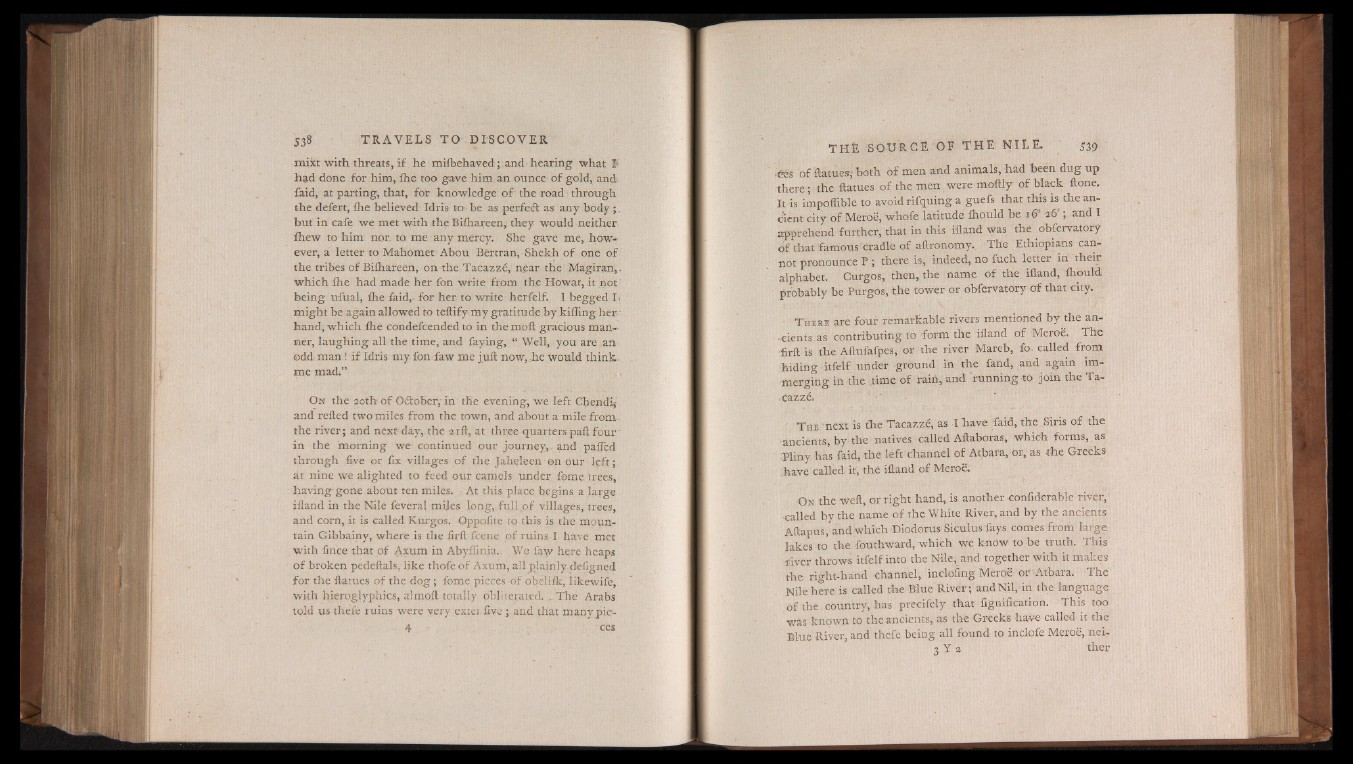
mixt with threats, i f he mifbehaved; and hearing what t
had done for him, ihe too gave him an ounce o f gold, and
faid, at parting, that, for knowledge o f the road through
the defert, ihe believed Idris to be as perfeft as any body ;,
but in cafe we met with the Bifhareen, they would neither
fliew to him nor- to me any mercy. She gave me, however,
a letter to Mahomet Abou Bertran, Shekh o f one o f
the tribes o f Bifhareen, on the Tacazze, n,ear the Magiran,.
which ihe had made her fon write from the Howat, it not
being ufual, ihe faid,- for her to write herfelf. I begged 11
might be again allowed to teftify my gratitude by k illing her
hand, which ihe condefcended to in the moil gracious manner,
laughing all the time, and faying, “ Well, you are an
odd m a n ! i f Idris my fon faw me jvift n ow ,h e would think,
me mad.”
O n the 20th o f October, in the evening, we left Cljendij
and refted two miles from the town, and about a mile from
the river; and next-day, the 21ft, at three quarters pail fo u r '
in the morning w e continued our journey, and palled
through five or fix villages o f the Jaheleen on our le f t ;
at nine we alighted to feed our caniels under feme trees,
having- gone about ten miles. , At this place begins a large
iiland in the Nile feVeral miles long,, fu l l .o f villages, trees,
and corn, it is called Kurgos. Oppoiite to this is the mountain
Gibbainy, where is the firft fcene o f ruins I have met
with fince that o f Axum in Abyilinia.- We fayr here heaps
o f broken pedeftals, like thofe o f Axum, all plainly deligned
fo r the ftatues o f the dog ; fome pieces o f obelifk, likewife,
with hieroglyphics, almoft totally obliterated. ..The Arabs
told us thefe ruins were very extei.five; and that many pie--
4 ces
.ccs o f ftatues-; both o f men and animals, had been dug up
there; the ftatues o f the men were moftly o f black ftone.
It is impoffible to avoid rifquing a guefs that this is the ancient
city o f Meroe, whofe latitude ihould be 160 26'; and I
apprehend further, that in this ifland was the obfervatory
O f that famous cradle o f aftronomy.. The Ethiopians cannot
pronounce P ; there is, indeed, no fuch letter in their
alphabet. Curgos, then, the name o f the ifland, ihould
probably be Purges, the tower or obfervatory erf that -city.
T h e r e are four remarkable rivers mentioned by the an-
■eients.as contributing to form the ifland o f Meroe. The
firft is the Aftufafpes, or the river Mareb, fo. called from
hiding itfelf under ground in the fand, and again im-
merging in the time o f rain, and running to join the Ta-
cazze.
T h e next is the Tacazze, as I have faid, the Siris o f the
-ancients, by the natives called Aftaboras, which forms, as
Pliny has faid, the left channel o f Atbara, or, as the Greeks
h a v e called it, the ifland o f Meroe;
O n the weft, or right hand, is another confiderable river,
•called by the name o f the W hite River, and by the ancients
Aftapus, a n d which Diodorus Siculus fays comes from large
lakes to the fouthwatd, which we know to be truth. This
•river throws itfelf into the Nile, and together w ith it makes
the right-hand channel, inclofing Meroe or Atbara. The
Nile here is called the Blue Riv er; and Nil, in the language
o f the.country, has precifely that fignification. This too
was known to the ancients, as the Greeks have called it the
Blue River, and thefe being all found- to inclofe Meroe, nei-
3 Y 2 ther